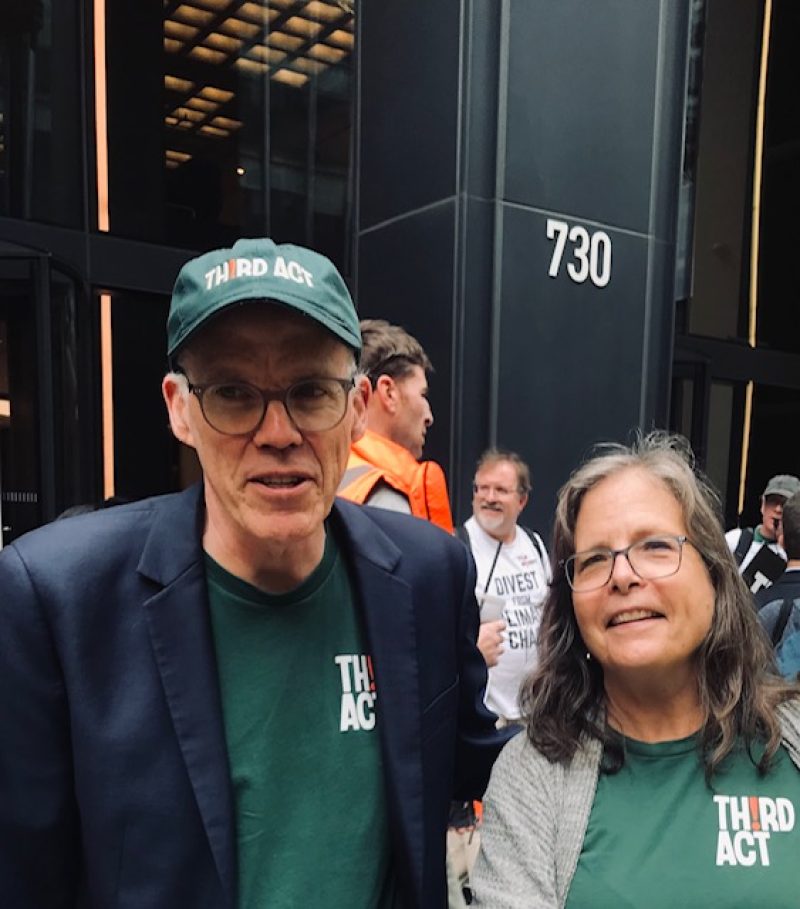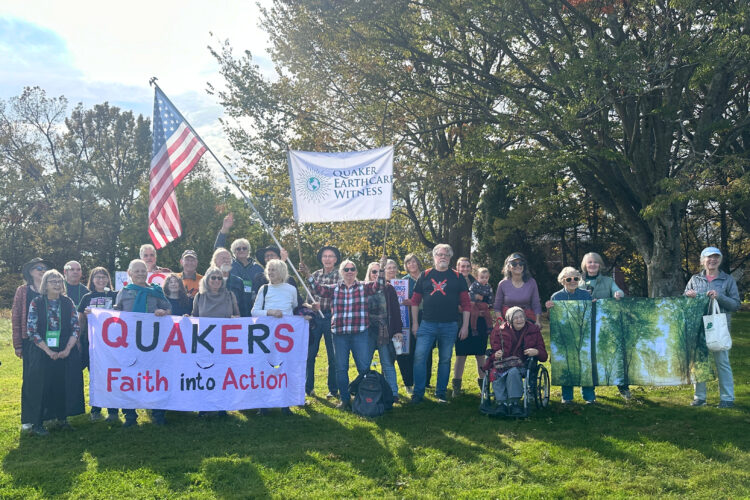The Un-Quaker Practices of TIAA

The Un-Quaker Practices of TIAA
by Laura Hulbert
Imagine you smell bleach when you take your class out to the school yard. It’s not a faint smell. The tag-players are short of breath. The kids on the monkey bars are coughing and sneezing, and one girl is dry heaving over by the fence.
A week later, after you’ve had to keep the kids indoors for recess, you’re called into the principal’s office. There on the sofa is Jack, the boy who volunteered in your classroom for community service credits last year. The principal recounts that they’ve caught Jack on camera pouring gallons of bleach into the soil under the jungle gym, one cup at a time. It makes absolutely no sense to you. Why would an Eagle scout and a class president undermine children who he professes to like? After much prodding, Jack outs his uncle. He’s been paying Jack to turn the playground into a hazardous waste site so his rubber mulch tile factory will get some business. The prospect of profit erodes even strong values, it turns out.
What does this scenario have to do with you? A lot, if you consider Jack to be a stand-in for TIAA, the holder of your retirement funds. While you’ve been taking TIAA at their word that they’re “Build[ing] a future you can count on,” their practices are actually impeding the future of the planet and all of us who inhabit it.
In prioritizing profit over planet, TIAA’s practices are decidedly un-Quaker. Let’s start with the Quaker testimony of stewardship, responsibly caring for people and places. Your retirement investments are being used to contravene the warning of the Intergovernmental Panel on Climate Change (IPCC) that coal must be completely phased out. TIAA is the fourth largest holder of coal bonds in the world and continues to be a major source of capital for new coal mines. TIAA claims to be a leader in sustainable investing, yet holds at least $78 billion in fossil fuels. Does this sound like stewardship to you?
In addition to practicing irresponsible stewardship, TIAA’s investments violate the Quaker testimonies of community and equality. TIAA, the largest manager of farmland and timberland in the world, is involved in funding some of the most destructive practices. In Brazil, for example, your retirement money has been buying land in the most biodiverse savannah in the world, the Cerrado. TIAA purchases land that recently belonged to Black and Indigenous farmers and was deforested by known, illegal land-grabbers to make way for vast monocrops of soybeans mostly used to feed beef cattle. In other words, your retirement investments are both destroying biodiversity and fostering the violent displacement of communities of color. The communities downstream are negatively impacted too as the chemicals that are used on row crops pollute land and water. In Elaine, Arkansas, site of the largest race massacre in US history, local residents are being poisoned by the pesticides sprayed on TIAA-owned lands. Your employer’s espousal of the link between the divine light in everyone and the mandate for social justice? Irrelevant when it comes to offering you a retirement plan, apparently.
Will it surprise you that TIAA’s practices make mockery of the Quaker testimony of integrity? Integrity is defined by the American friends Service Committee Testimonies as “consistency in word and deed.” To be a moral human specimen, your talk and your walk need to align. TIAA’s website uses images, color palette, and slogans to make the claim that the company supports a healthy sustainable future for all. Meanwhile it is keeping the real information about its investments from you. Try to figure out precisely where your retirement monies are invested, and you’ll find it very difficult. The Institute for Energy Economics and Financial Analysis, among other entities, spent months digging through SEC filings and other documents to unearth that TIAA is investing our money in Chevron, Halliburton, Enbridge and ExxonMobil.
Some may say that this estrangement from the norms they hold dear is a necessary evil where investments are involved. But as renewable energy becomes cheaper and more governments regulate fossil fuel use, the long-term financial outlook for fossil fuels is poor. The banks and pension funds that are slow to divest are very likely to be left holding “stranded assets”—fossil fuel generators that can no longer be used, and so will be worth nothing. TIAA clients, for example, now own two defunct coal mines in Ohio and West Virginia. A 2023 study by a team of researchers at the University of Waterloo showed that public pension funds would have seen 13% higher returns—a difference of $20 billion—if they had divested from fossil fuels ten years before.
Smart managers, including OECM in Canada, ABP, the largest pension fund in the Netherlands, the Rockefeller Brothers Fund, and Sphere in the US have proved that you can save wisely without fossil fuels. Net zero by 2050? We don’t have time for that.
I’m sure that when we employees of Quaker schools think of fiduciary responsibility, we don’t imagine it requires setting our values aside and prioritizing our wealth over the well-being of poorer communities in other parts of the world or the futures of the students we teach.
In 2022, Bill McKibben, Noam Chomsky, and Judith Butler approached the Principles of Responsible Investment, a UN-supported network of companies, to submit a formal complaint against TIAA. The complaint was researched and drafted by TIAA Divest! volunteers and signed by over 700 academics. Please join your voice to theirs! Email members of the TIAA Board of Governors—Cecilia Conrad, Ronald J. Daniels, Risa Lavizzo-Mourey, Theodore Mitchell, and David K. Wilson,—and let them know that their investment decisions need to live up to their rhetoric of sustainability.
Jack’s schoolmates deserve better than poisonous profits.

